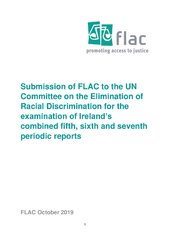FLAC calls for improvements in equality mechanisms at UN ICERD examination in Geneva
2 December 2019

The Chief Executive of legal rights group FLAC Eilis Barry is at the United Nations HQ in Geneva today to raise concerns about the lack of legal aid for racial discrimination and harassment claims in Ireland ahead of a UN examination of the Irish government delegation.
The UN Committee on the Elimination of Racial Discrimination will hear today from a broad range of civil society organisations on how the human rights of people from various ethnic and minority backgrounds in Ireland are being realised. Among these, FLAC will be highlighting the need to make the State civil legal aid scheme more accessible and the introduction of equality mechanisms.
“Civil legal aid is a gatekeeper right - it unlocks access to other basic rights that promote and protect people. In Ireland there are substantial barriers to this vital mechanism. At present, there is no legal aid for claims of harassment and discrimination, including claims of discrimination in access to education, housing, goods and services and in social welfare appeals no matter how difficult, complex or sensitive these claims may be and no matter how little resources a person claiming harassment of discrimination may have”, said FLAC Chief Executive Eilis Barry ahead of the UN briefing.
“FLAC is calling on the Minister for Justice and Equality to prescribe the Workplace Relations Commission and the Social Welfare Appeals Office as designated bodies for the purposes of providing legal aid. FLAC is also concerned that the lack of availability of legal representation in these types of cases means that many Travellers, Roma, persons of African origin and other ethnic minorities cannot present their cases of discrimination and harassment, depriving them of equality before the law and the right to equal treatment before Tribunals as required by ICERD”, stated Ms. Barry.
Further there is a lack of clarity as to whether the Legal Aid Board can provide legal aid in cases involving housing and homelessness due to an exemption in relation to “disputes concerning rights and interests in or over land.” The Legal Aid Board takes the general view that eviction proceedings constitute “a dispute concerning rights or interests over land” and are for the most part excluded from the remit of the civil legal aid scheme. The reality is that it is very difficult to obtain legal aid in housing and homelessness cases.Travellers encounter difficulties accessing civil legal aid for forced evictions and in relation to housing and homelessness.The Legal Aid Board should be empowered and resourced to be able to provide legal aid in housing and homelessness which is one of the biggest areas of unmet legal need.
FLAC will also highlight concerns regarding current anti-discrimination legislation.
“The Equal Status Acts 2000 – 2015 prohibit discrimination on the grounds of race, ethniicity and membership of the Traveller community in the provision of goods and services, the provision of accommodation and access to education . However, it is unclear to what extent the prohibition on discrimination on the ground of race, ethnicity and membership of the Traveller community applies to public authorities such as An Garda Síochána and immigration services when they are performing functions which may not come within the definition of “services”. The definition of “services” in the Act should, with only necessary and proportionate exceptions, include functions of the State most relevant to discrimination on grounds of race, ethnicity and membership of the Traveller community such as immigration, citizenship and police powers”, Ms. Barry stated
FLAC’s submission to ICERD also includes recommendations in relation to the need for adequate remedies in relation to hate speech and racial profiling.
Ms. Barry concluded, “The role of NGOs to represent and advocate for human rights is critical and requires ongoing attention, inclusion and investment. As an NGO we recognize there has been a great deal of progress for human rights and equality in Ireland, however we urgently need be more proactive so that racial discrimination can be eliminated. This ICERD examination gives us an opportunity to reflect on how best to move forward.”
FLAC’s submissions are available on our website at: https://www.flac.ie/publications/category/policy/
About FLAC (Free Legal Advice Centres):
FLAC is a human rights organisation which exists to promote equal access to justice. As an NGO, FLAC relies on a combination of statutory funding, contributions from the legal professions and donations from individuals and grant-making foundations to support its work.
FLAC offers basic legal information through its telephone information line (1890 350 250) and free legal advice through its network of volunteer evening advice centres – more at www.flac.ie/help/.
FLAC is an Independent Law Centre that takes on cases where this is in the public interest. FLAC also campaigns on a range of issues, including consumer credit, personal debt, fairness in social welfare law, public interest law and civil legal aid. FLAC operates the Public Interest Law Alliance (PILA), which seeks to engage the legal community and civil society in using the law to advance social change.
FLAC has recently worked to improve access to justice in particular for Roma and Traveller women as part of the JUSTROM (Joint Programme on Access of Roma and Traveller Women to Justice) programme, a Council of Europe initiative. The pilot programme aimed to increase Roma and Traveller women’s awareness of their rights and existing complaint mechanisms, with a particular focus on anti- discrimination and equality of opportunity. Within JUSTROM, FLAC supported the running of legal clinics for Travellers and Roma. FLAC with the financial assistance of the Department of Justice currently operates a legal clinic for the ROMA community. It also within its limited resources continues to engage in legal representation for members of the Traveller community, primarily in the area of accommodation provision. The experience of those clinics and litigation is drawn on in the ICERD submission to highlight specific matters of importance to achieving equality for those communities.